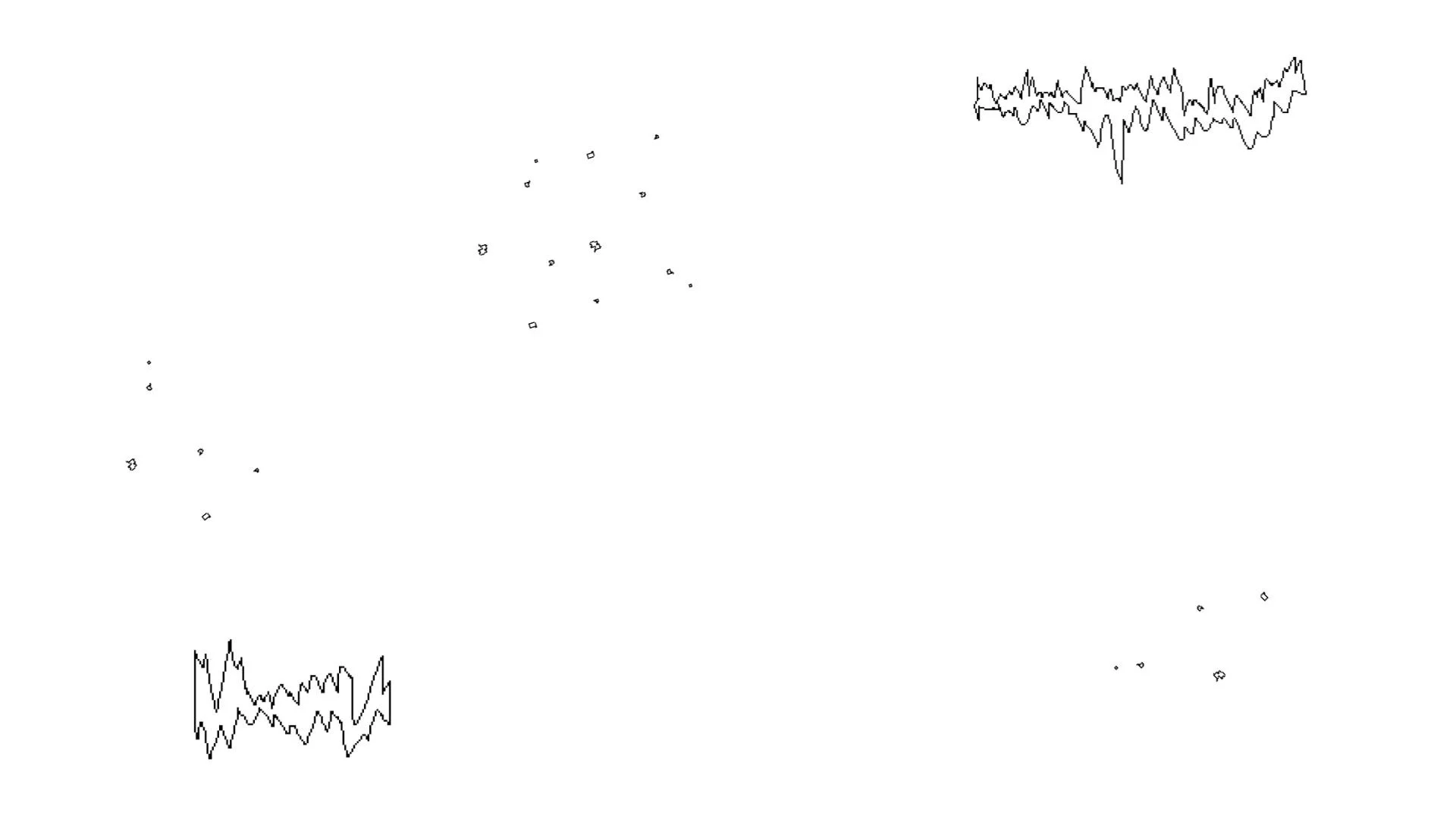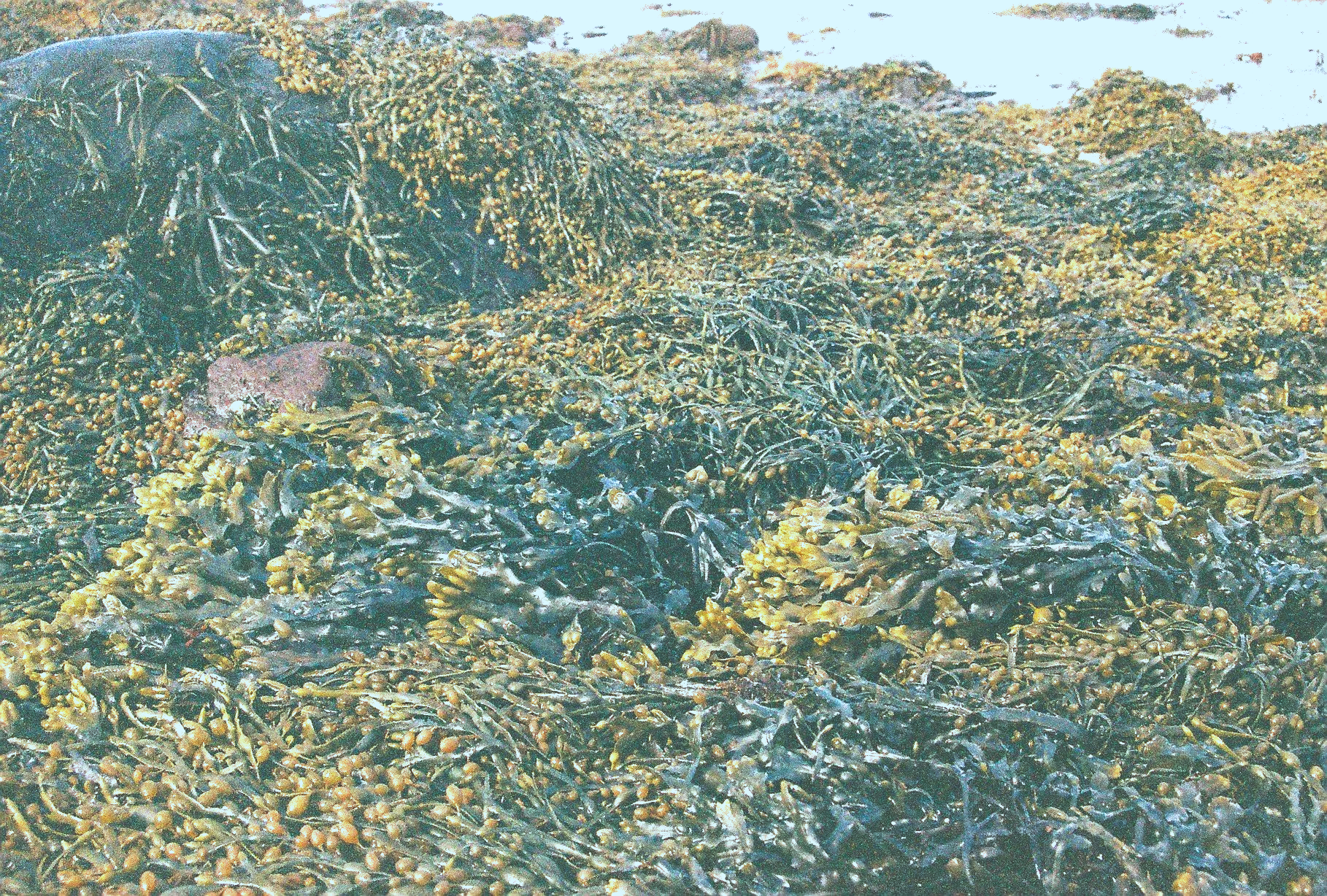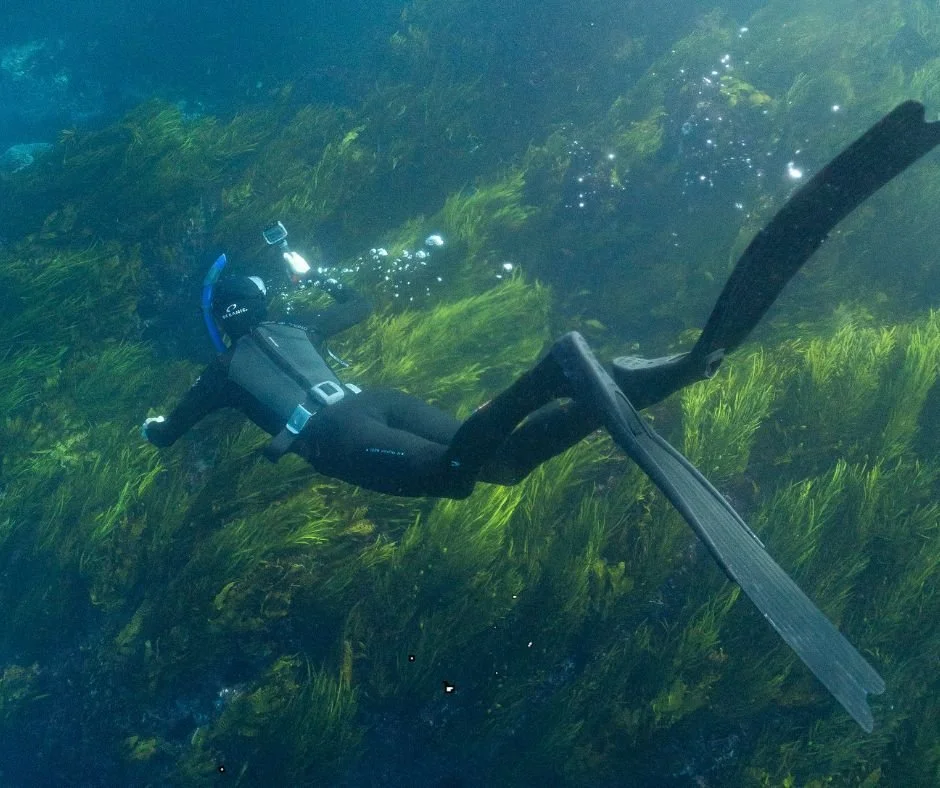

Seaweed People is an independent, listener-supported podcast about seaweed, people and coastal restoration, produced and hosted by Jess Hamilton.
It's for you if you're interested in what seaweed is, how it works in ecosystems, growing it for food or climate solutions and the intersection of science, art and culture to protect and regenerate coastal communities.

"Love this pod! Just what I needed to learn more about sparkling seaweed futures in Australia" - podcast review
〰️
"Love this! I love seaweed and the ocean and I love listening to kelp chat" - podcast review
〰️
"Love this pod! Just what I needed to learn more about sparkling seaweed futures in Australia" - podcast review 〰️ "Love this! I love seaweed and the ocean and I love listening to kelp chat" - podcast review 〰️
-
This episode is for you if you’re wondering what the heck is going on across the sea for our friends in the US, if you’re into citizen science and communities coming together to protect kelp, and if you like a good ocean film 🌊🍿
Blue Frontier is a US-based organisation that’s been building solution-oriented citizen engagement for 20 years, to protect oceans, coasts and the human and wild communities that depend on them. We’re joined by Blue Frontier’s David Helvarg and Natasha Benjamin to talk about people-powered conservation, the seaweed rebellion and their new film Sequoias of the Sea, which documents a community of fishermen, tribes and scientists working to restore a kelp habitat devastated by a warming climate.
-
This one’s for you if you’re an artist, or a scientist or conservationist wanting to communicate in creative ways, and if you love the deep sea, the Great Barrier Reef and Kate Bush 🪸💎
Kirsty Kross is an eco-feminist Australian artist currently based in Oslo, Norway, whose work is about finding ways of connecting diverse groups with issues around the climate crisis, often by embodying a vibrant coral trout. We talk about deep sea mining, mesopotamian deities, which countries are two-tit countries and a seaside collaborative opera performance 📣🪼
-
This one’s for you if you’re into nudibranchs, sea grapes, solar power, butterflies, citizen science and tongues with teeth(!?)
Nicole Mertens is a marine ecologist with a passion for sacoglossans, a science communicator and the Nature Stewards Coordinator with the Victorian National Parks Association. Nicole is passionate about using citizen science as a platform for evidence-based conservation, and helping people connect with their local environment.
-
This one’s for you if you’re interested in how a class action case works, if you wanna hear about seaweed farmers taking on big oil companies or if you’re also a soil person.
Freya Mulvey is a senior lawyer and environmental enthusiast who is passionate about implementing better soil and landscape regulation into policy and legal frameworks. She is a 2023 Churchill Fellow and a 2017 recipient of the Australian Lawyers Alliance Civil Justice Award for her work on the Montara Oil Spill. She is also a published author of the book Ground Breaking: Soil Security and Climate Change. We're also making a podcast together!
-
This one’s for you if you’re interested in biochar, giant kelp, marine engineering or thinking about seaweed as a solution to a whole lotta problems.
Adam Brancher is a Principle Marine Surveyor and the Founder of Southern Ocean Carbon (now known as Next Wave Seaweed), which aims to mitigate the impacts of climate change through responsible seaweed mariculture and bio-mitigation around aquaculture farms. We touch on a few of the exciting projects his team is working on across the world in this episode, such as growing seaweed for bioplastics, offshore mariculture, IMTA and seaweed for food security.
-
You’ll love this ep, I just know it. It’s for you if you like baby seahorses and migrating whales, if you live in a coastal city, if you've heard about wildlife coming back into harbours during lockdowns, or if you want to know what a strong collaboration between Indigenous knowledge-holders and western science looks like.
Robert Cooley is a Senior Ranger and leader of the Gamay Rangers, an Indigenous ranger team that cares for country on Gamay, or Botany Bay in Sydney, and on conservation land owned by the La Perouse Local Aboriginal Land Council. Since 2019, the Gamay Rangers team have been regenerating coastal habitats, protecting marine mammals, providing food for vulnerable people during Covid lockdowns and connecting local communities to Sea Country in Australia’s biggest city.
-
This one’s for you if you’re into craft beer, you like dreaming up side hustles with your mates, you’re a chef wanting to experiment with kelpy umami or if you’re an aspiring seaweed farmer.
Cam Hines and Brent ‘Bert’ Cross are two of te three founders of Southern Seagreens. From backgrounds in craft beer and naval diving, they joined forces with Rob (the third, a scientist) to learn how to farm native kelp at their sea farm down in Flinders, Victoria. They also hunt wakame, one of the world’s most invasive (yet delicious) species, and turning it all into tasty treats.
-
This is maybe as seaweed peopley as it gets. It’s for you if you want an overview of kelp forests, if you’re into rewilding and sea otters, if you have any kind of skill and want to put it toward conserving kelp, if you like the sound of a national marine gardening day or if you just want to hear about a big, impressive enviro movement.
Aaron Eger is the Founder and Program Director of the Kelp Forest Alliance, a global community of kelp restoration and conservation practices and research that evolved from his PhD. He was the lead author of the first ever kelp restoration guidebook and facilitated the creation of the Kelp Forest Challenge, a global mission to protect and restore 4 million hectares of kelp forests by 2040.
-
You’ll enjoy this episode if you like games, if you’re a scientist looking for creative ways to communicate your research, if you run a music festival, a council or small town and want to know how to talk about climate change with your townsfolk 💥
Boho Interactive is a collective of Australian artists, performers and game designers who create interactive games, performances and workshops in collaboration with research scientists. Their games have been played or experienced in theatres, festivals, museums, conferences and boardrooms. One such game is the urchin-lobster battle ‘Best Kelp Secrets’, commissioned by Australia’s national science agency, the CSIRO.
Joining me today and playing the part of shiny lobster, is one part of this big creative team, Nathan Harrison.
-
This one’s for aspiring seaweed farmers, kelp ladies and anyone who loves a good seaweed yarn. We’re talking seaweed babies, wild harvesting, kelp farming and Ecklonia radiata - the backbone of the Great Southern Reef, also known as common kelp, leather kelp, thorny kelp or golden kelp.
Jo Lane has a background in marine science and sustainable coastal environments and is the owner of Sea Health Products, which make small-batch kelp products on the South Coast of NSW. She’s currently working on asparagopsis in South Australia as a research Lead with the Australian Sustainable Seaweed Alliance and, as a quite serious “side hustle”, she’s also developing kelp seedstock with a view to get kelp farming and restoration projects happening in Australia.
-
Ooh yes, today we are hearing all about oysters! Also seascape restoration, pseudo-mangroves, living seawalls and a good use for potato chip waste. This one’s for you if you’ve heard that 85% of global oyster reefs are degraded thanks to humans (yikes) and if you want to know how we can help bring them back
Professor Melanie Bishop is a coastal ecologist who researches changes to temperate environments like coastal erosion, nutrient enrichment, and marine urban sprawl, as well as engineering interventions to create habitat and conserve native biodiversity in degraded seascapes. She co-leads the working group of the World Harbour Project as well as the Living Seawalls Program, which is part of SIMS Project Restore.
-
Macrocystis! This episode is for you if you’ve always dreamt of diving through the iconic giant kelp forests in Tasmania, and if you’ve heard that they’ve completely disappeared, but also and if you want to hear about divers and scientists coming together to revive them 🏥🌱
Mick Baron is an avid diver, storyteller, underwater videographer and co-owner of the Eaglehawk Dive Centre. He’s spent 20 years as a scientific observer on fishing vessels in sub-Antarctic to tropical waters, and is an active campaigner for local marine conservation.
-
This episode is for you if you like rivers and oceans, if you want to connect deeper to Sea Country, if you live in Australia or another country where the dominant narrative of the ocean stems from a colonial or European history. Maybe you’re an educator or social worker, or you just love being outside.
Rhiannon Mitchell is a First Nations woman from the Mununjali people of Beaudesert, who grew up on Gumbaynggirr Country. She’s the founder of Saltwater Sistas, where she teaches young Aboriginal women and girls about the marine environment through mentoring, workshops, ocean conservation and connecting to Country.
This episode touches on land theft and other themes of colonisation, so please listen with care.
-
This episode’s for you if you’re into eating seaweed, sustainable food systems, Nitrogen cycles, how seaweed can heal burns, or if you’ve ever daydreamed about being a humble seaweed farmer 🧑🌾🍝
Dr Pia Winberg is a marine ecologist who’s spent the past 25 years working in and researching sustainable marine development. In her words, she’s now in “the business of growing seaweed in a circular economy” and her main focus is developing systems to sustainably cultivate seaweeds in Australia. She runs two companies, Phycohealth and Venus Shell Systems, she has seaweed products on the shelves of supermarkets and she’s currently testing the wound-healing properties of seaweed cells. -
Item descriptionYou’ll like this episode if you’re interested in artists working with seaweed or teaming up with scientists, what cuttlefish look like when they mate, kayaks that play music, or if you’ve ever wondered whether humans will one day be able to carry sharks in their wombs🦈🤰🏻
Lichen Kelp is an artist, performer and curator based in Wurundjeri Woi-wurrung country, in Naarm AKA Melbourne. Through her work she explores melting, subliming, fruiting, flowering, decomposing, bubbling and shapeshifting and she builds communities around marine algae and other ecologies. She also runs the Seaweed Appreciation Society International.
-
If you’re into biodiversity hotspots, temperate reef ecosystems, protecting your local beach, collective action, or if you’re working in the media or education sector then this episode is for you 📣🦑
Dr. Scott Bennett is a research scientist at the Institute of Marine and Antarctic Studies at the University of Tasmania. He was born and raised on Tassie’s reefs, and he’s studied kelp forest ecosystems across Australia. He currently leads the scientific advisory panel of the Great Southern Reef Foundation and along with a very impressive team of cinematographers, scientists and local communities, he’s putting the Great Southern Reef on the map and building the science and stories needed for its protection.
-
This one’s for you if you want to know the difference between seagrass and seaweed, how crayweed reproduces, what reforestation looks like, or if you’re dreaming of becoming a marine scientist and just need a good role model.
Professor Adriana Verges has researched temperate ecosystems and coral reefs around the world. She leads a research program that looks into the impacts of climate change on seaweed forests and seagrass meadows and restoration approaches for their conservation. She also leads restoration projects Operation Crayweed and Operation Posidonia.
Listen to the episode // Read the transcript
-
This one’s for you if you want to know what seaweed is and what it does in the ecosystem, whether sinking it in the deep ocean is a legit climate change solution and what a kelp trumpet sounds like.
Dr Catriona Hurd is a seaweed physiologist with nearly 30 years experience across the planet studying how seaweeds grow and how they cope with things like ocean acidification and climate change. Her recent research in forensic carbon accounting assesses the role that seaweeds can play in carbon sequestration.
EPISODES
get in touch 🌱🪸🐟🦀🫧

This website was made possible thanks to support from the Blue World Valerie Taylor Ocean Prize



















